This book is basically what the title claims. I was actually hoping for something a  bit more technical, but this book really is concise and focused mostly on basic historical facts. If you don’t know anything about the history of computing, this is a great place to start. If you already know the basic deal, I’d skip it.
bit more technical, but this book really is concise and focused mostly on basic historical facts. If you don’t know anything about the history of computing, this is a great place to start. If you already know the basic deal, I’d skip it.
Category: Nonfiction
The Adventure of English
A great little book describing the history of English. Its only flaw (which I hesitate 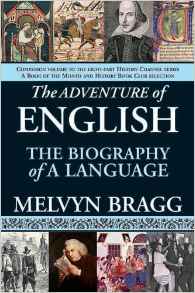 to call a flaw because the author is quite aware of it) is that in the book’s exuberance for the specialness of English, it can get quite a bit too teleological. Just about any claim in English’s favor could be easily explained as survivor bias.
to call a flaw because the author is quite aware of it) is that in the book’s exuberance for the specialness of English, it can get quite a bit too teleological. Just about any claim in English’s favor could be easily explained as survivor bias.
Still, it’s a fun romp through the history of the English language, and worth a read.
Bellevue: Three Centuries of Medicine and Mayhem at America’s Most Storied Hospital
This is a well-researched history of New York’s Bellevue hospital. The author 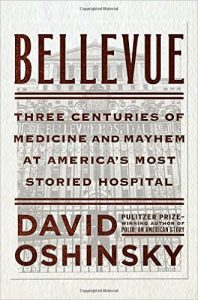 cleverly uses what is ostensibly a sort of biography of Bellevue to explore the history of medicine since the 18th century, and to explore the relation between hospitals, the government, and the public in the United States. It’s fascinating stuff.
cleverly uses what is ostensibly a sort of biography of Bellevue to explore the history of medicine since the 18th century, and to explore the relation between hospitals, the government, and the public in the United States. It’s fascinating stuff.
Uncharted
Caveat: I have met and like one of the authors, so I am biased.
I enjoyed this book, though I worry time will treat it poorly, as it has already been 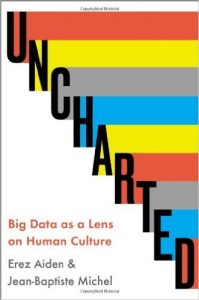 victimized by the authors’ success. This book is basically a description of how the authors (and others) created google ngrams. It’s not just technical stuff either – it’s a lot of their philosophy of what they find interesting.
victimized by the authors’ success. This book is basically a description of how the authors (and others) created google ngrams. It’s not just technical stuff either – it’s a lot of their philosophy of what they find interesting.
The problem is that a lot of the book consists of interesting patterns and correlation they found using ngrams. The correlations are neat, but given how popular ngrams has gotten (and especially its spike in popularity a few years ago, the examples don’t feel as exciting as they must’ve when the book first came out. This isn’t exactly a knock against the book, but it does make some large sections of it less interesting than they might’ve been.
Everybody Behaves Badly: The True Story Behind Hemingway’s Masterpiece The Sun Also Rises
A delightful history of how the book The Sun Also Rises got written. It’s basically 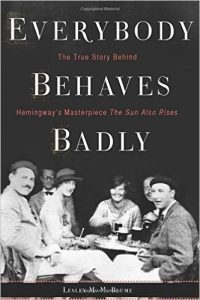 a slice of Hemingway’s early life, right up until that book made him famous (and a tiny bit afterward). My only gripe is it participates in this notion about Hemingway that I’m not quite ready to sign up for – that he was some sort of master of image creation. I’m sure he put forward an image of himself, but that’s true of every writer. It’s not obvious to me that he does it more than just about anyone else, and I don’t see him as especially calculating about it. I mean, he did put forward an image, but he also really actually liked drinking hard and watching bullfights.
a slice of Hemingway’s early life, right up until that book made him famous (and a tiny bit afterward). My only gripe is it participates in this notion about Hemingway that I’m not quite ready to sign up for – that he was some sort of master of image creation. I’m sure he put forward an image of himself, but that’s true of every writer. It’s not obvious to me that he does it more than just about anyone else, and I don’t see him as especially calculating about it. I mean, he did put forward an image, but he also really actually liked drinking hard and watching bullfights.
Still, it’s well-researched and tells a great story about a great story. If you’re interested in Hemingway, you’ll like it.
My Best Mathematical and Logic Puzzles (Dover Recreational Math)
I finally got myself into Martin Gardner, and I enjoyed myself thoroughly. My 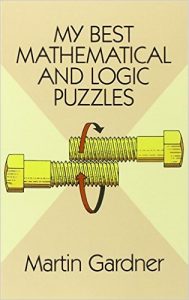 only complaint (and, it’s a bullshit complaint) is that I really prefer a particular type of puzzle – the kind that is simple enough to easily hold in one’s head, and which doesn’t benefit from having pencil and paper. Some of the puzzles had interesting results, but really just required you to sit and write out a little algebra.
only complaint (and, it’s a bullshit complaint) is that I really prefer a particular type of puzzle – the kind that is simple enough to easily hold in one’s head, and which doesn’t benefit from having pencil and paper. Some of the puzzles had interesting results, but really just required you to sit and write out a little algebra.
Wonderland: How Play Made the Modern World
This book was a bit light, but still very enjoyable. The thesis is that play and 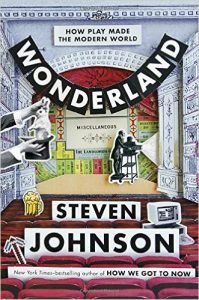 pleasure very important to the history of science, technology, and culture. As an example, Johnson argues that interest in automata helped lead (if a little indirectly) to the development of computers. Apparently, Babbage was quite interested in these early robots as a child, and it probably influenced his work. Johnson discusses other topics, such as the spice trade and the development of the Jacquard loom.
pleasure very important to the history of science, technology, and culture. As an example, Johnson argues that interest in automata helped lead (if a little indirectly) to the development of computers. Apparently, Babbage was quite interested in these early robots as a child, and it probably influenced his work. Johnson discusses other topics, such as the spice trade and the development of the Jacquard loom.
I found this book fun, though I’m not quite prepared to buy the thesis as such. After all, anything that reaches fruition as a technology must first have been imagined. It’s hard to think of any interesting contraption whose origins couldn’t be traced back to something fun, in part (I suspect) because fun things tend to be easier to make. It’s hard to think of space-rockets coming into existence without someone first making toy versions. Furthermore, people play with all sorts of stuff that, of course, does NOT lead to technological revolutions.
Neurocomic
This is a short comic, which provides a quick sort of overview of some basic 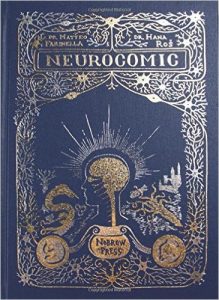 neuroscience and history of brain studies. It’s an interesting idea, but it didn’t really work for me. The artwork is very rudimentary, and the concepts are fairly straightforward. It didn’t feel to me like the ideas especially benefited from a comic format. The book did have an interesting sort of dreamy feel, in which a man goes through a sort of Alice in Wonderland style world of the mind, but ultimately I didn’t feel the concept paid off so much as provided occasional enigmatic bookends to sections.
neuroscience and history of brain studies. It’s an interesting idea, but it didn’t really work for me. The artwork is very rudimentary, and the concepts are fairly straightforward. It didn’t feel to me like the ideas especially benefited from a comic format. The book did have an interesting sort of dreamy feel, in which a man goes through a sort of Alice in Wonderland style world of the mind, but ultimately I didn’t feel the concept paid off so much as provided occasional enigmatic bookends to sections.
The Master of Auschwitz
What a weird and fascinating memoir. Basically, while the British held him after  the war, Höss wrote out a memoir, a few short documents, and some letters. They are collected in this book, which through its strangeness becomes a sort of lesson in evil. It is remarkable how utterly banal much of his descriptions of Auschwitz are. Much of his writing dwells on what are basically HR problems, having to do with lazy employees or employees who did a good job but created a bad work environment.
the war, Höss wrote out a memoir, a few short documents, and some letters. They are collected in this book, which through its strangeness becomes a sort of lesson in evil. It is remarkable how utterly banal much of his descriptions of Auschwitz are. Much of his writing dwells on what are basically HR problems, having to do with lazy employees or employees who did a good job but created a bad work environment.
When the methods of mass murder are described, they are done in a remarkably clinical manner, almost as if he’s describing any sort of factory equipment, in terms of its efficiency and effectiveness.
There’s also a sense of incompleteness borne of inconsistency here. At times Höss seems prepared to apologize and admit he lost his way. At other times, he reaffirms his commitment to national socialism, or makes comments about how dangerous Jews are. He also, perhaps most inexplicably, complains about the bad treatment he felt he was receiving as a prisoner.
Definitely worth reading, as it is a sort of window into a particular form of deranged compartmentalization.
We Have No Idea: A Guide to the Unknown Universe
I’m trying to figure out how I should handle books by people I know, given that it means I’m not a reliable source. I think from now on, I need to just have a blanket caveat. So, here goes:
I know the author (one of them, anyway) so I am not a reliable source.
Bam. OK, so this is a sort of quick primer on all sorts of areas of particle physics and cosmology where we don’t have a good sense of what’s going on, such as with Dark Energy or the nature of time. It is peppered with jokes and comics to lighten things up a bit. So, if you’re a fan of Jorge Cham and want to learn some physics of the universe, I recommend it!
